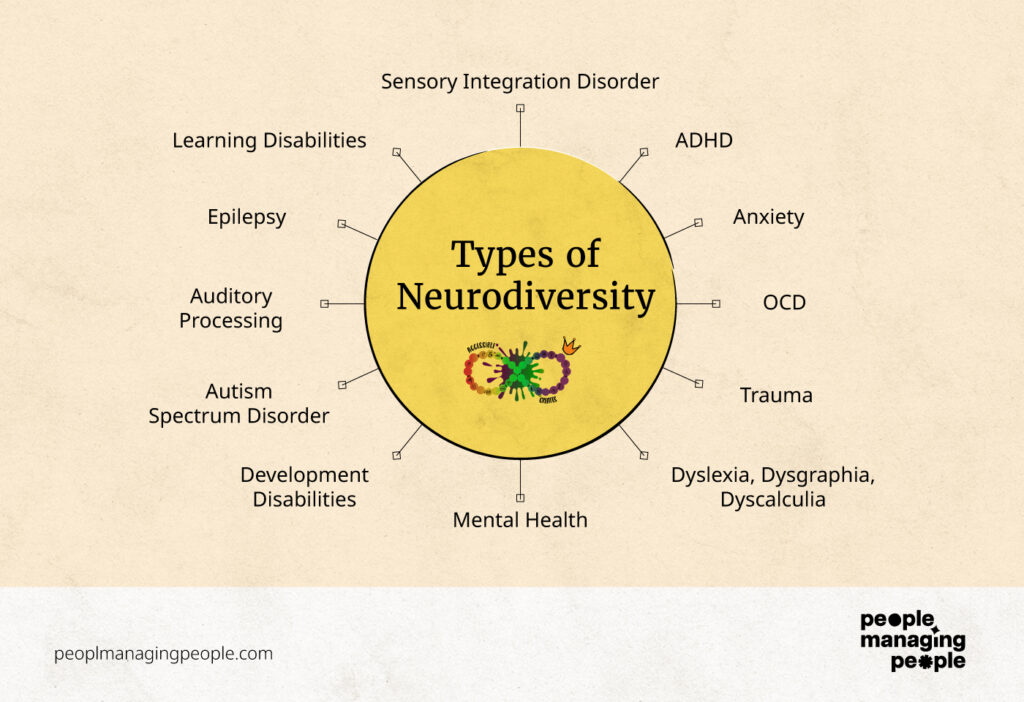“Unemployment for neurodivergent adults runs at least as high as 30-40%, three times the rate for people with a disability and eight times the rate for people without disabilities.” (MyDisabilityJobs, 2022).
Neurodiverse adults have been in the workplace for a long time, but they have also not been included in the workforce for a long time.
What do I mean by this?
A lot of times, neurodivergent individuals choose not disclose they're neurodivergent or have a neurodivergent condition out of fear of being stigmatized.
People have a perception that those who are neurodivergent e.g. those with Autism Spectrum Disorder (ASD) or Attention Deficit Hyperactivity Disorder (ADHD) cannot work because of it.
This couldn’t be further from the truth.
I am an HR Professional who is also neurodivergent. I consult with organizations to help them make HR, and other business operations, more accessible and inclusive. I do this by providing workshops and training on initiatives such as an accessible recruitment process and supporting employees and candidates who have disabilities and are neurodiverse.
Here I’ll take you through what neurodiversity in the workplace means, the benefits of supporting neurodiversity in the workplace, and how to support neurodiversity in the workplace.
- What is neurodiversity in the workplace?
- Benefits of supporting neurodiversity
- How to support neurodiversity in the workplace
What is neurodiversity in the workplace?
Neurodiversity describes the idea that people experience and interact with the world around them in many different ways; there is no one "right" way of thinking, learning, and behaving, and differences are not viewed as deficits.
1 in 7 people has a neurodivergent condition
When people think of neurodiversity, they usually think of Autism Spectrum Disorder (ASD), and ADHD. However, there are so many more types under the types of neurodiversity umbrella as seen in the below diagram.

In the workplace, neurodiversity is a part of diversity, equity and inclusion that often goes ignored.
By this I mean a lot of companies focus on race, gender, and LGBTQ2S+ issues which are very important but do not understand and focus on neurodiversity.
Recently, there has been more focus on it as companies realize that supporting neurodiversity is good for business.
“The sooner companies tap into the hidden, unique talents of their neurodiverse workforce, the sooner they will recognize the value from these differences” (Conser and Poujol, 2022).
This means that while there is still a lot of work to be done in ensuring organizations support neurodivergence, the process has started within the corporate world.
As a whole, neurodiverse individuals are the most untapped talent pool. This is because a lot of neurodivergent workers and job seekers do not disclose that they’re neurodivergent because of the negative perception employers have of them.
A lot of tech companies such as SAP, Google, Dell are leading the way in supporting neurodiversity in the workplace. Therefore, a lot of companies not in the tech sector are under the impression that neurodiverse talent can only work tech jobs which is simply not true, as we’ll discuss more in the benefits section below.
Benefits Of Neurodiversity
Any organization that accommodates neurodiverse employees is more likely to benefit from access to a wide talent pool, decreased turnover, and more accessible products and services.
Access to a wider talent pool
By demonstrating and becoming known as an employer who supports neurodiverse people, as well as taking other measures such as making your recruitment process more accessible, you’ll have access to a wider pool of talent.
As mentioned above, Dell is an organization that supports neurodiversity and this benefits them by giving them access to a wide range of people with various skills that align with their goals of inclusion and meeting talent targets.
For example, their Autism Hiring Program has helped them tap into a new, highly-skilled talent pool.
“This program has helped us reach a very skilled talent pool that is often overlooked. We’ve seen the team members who have come in through our program drive incredible business results with a new way of thinking – leaving footprints of innovation on all that they do.” - Lou Candiello, Dell.
Decreased Turnover
Creating a work environment that supports neurodivergent and neurotypical employees makes them feel more included.
When employees feel included and supported, they’re more likely to stay with the organization (increased retention). The opposite is true too, when employees do not feel included and supported they’re more likely to leave an organization due to the non-inclusive workplace culture.
Using Dell’s Autism Hiring Program as an example again, it’s seen extremely high retention rates amongst hires through the program.
More Accessible Products and Services
By accommodating and making your workplace more accessible and inclusive for people neurodiverse people and people with disabilities, it will make your products or services more accessible too.
This is because you’ll know how to make things more accessible and inclusive, and your disabled and neurodivergent employees can help ensure that the company knows how to be inclusive and accessible in their interactions with customers.
For example, if designing a website, you’ll be more cognizant of making the user experience more accessible through the use of different forms of content.
Additional Benefits
Each employee should be considered for the unique experiences and contributions they offer as an individual.
This is because everyone, regardless if they’re neurodivergent or not, deserves to be seen as a whole person who brings a unique skill set and different life experience to the table that allows them to do well in their work.
The biggest benefit is someone bringing themselves to work towards the common goal of the overall organization.
There are numerous ways to support neurodiversity in the workplace. These include reviewing and revamping your recruitment process, providing accommodations, effective communication, using inclusive and plain language, and training and education on disability issues

How to Support Neurodiversity in the Workplace
There are numerous ways to support neurodiversity in the workplace. These include reviewing and revamping your recruitment process, providing accommodations, effective communication, using inclusive and plain language, and training and education on disability issues
Recruitment
The hiring process is often the first impression someone gets of a company and, unfortunately, most hiring and interview processes are not very accessible and inclusive for neurodiverse talent.
Common barriers include job descriptions and the language used in them, as well as the questions asked in interviews and how they’re asked.
Accommodation statements are also a huge part of the process but they are often seen as an afterthought and given very little consideration (if they’re even in the job description and posting at all).
Accommodations statements let candidates know they can be accommodated at any time during the hiring process and have the information of who they can contact during the hiring process to notify of the need for accommodation, e.g. HR manager, specialist, or accessibility specialist if applicable within the organization.
So, how can you make your recruitment process more accessible for neurodivergent applicants?
Some key things to focus on are:
- Using more inclusive language in job descriptions e.g. “Must be able to move 50 pounds” when meaning lift heavy objects might be taken literally, instead say “Ability to lift heavy objects of 25-50 pounds”.
- Providing interview questions ahead of time
- Having an accommodation statement as mentioned above
- Have remote interviews and have closed captions enabled
- Providing training on learning how to make the recruitment process more accessible.
Accommodations
A lot of time when people think of accommodations they think they’re very expensive and are medical-based.
“Employer concerns can be summarized in three key areas: a perceived dearth of applicants; misconceptions around accommodation costs; and worries about negative impacts on workplace culture” (Kryhu, 2022).
The reality is that most accommodations cost very little and are considered “reasonable accommodation”.
First and foremost, listen to your employees to know what accommodations they need to be successful.
You can do this by simply having a conversation with them about what tools, resources, and support would make their lives easier.
I’d start by asking your employees formally e.g. an anonymous survey asking if they identify as neurodivergent, how they feel about the culture, and what they wish they had.
Another way is to ask informally. If you know one of your employees identifies as neurodivergent, ask them about how they feel about the culture and if there is anything they wish was done differently.
Examples of accommodations include:
- Noise-canceling headphones
- Quiet workspaces
- Being mindful that not everyone is good with eye contact
- Change job tasks or modify task order
- Provide reserved parking
- Change the presentation of tests and training materials
- Provide or adjust a product, equipment, or software
- Allow a flexible work schedule
- Mentoring programs e.g. having other employees who identify as neurodivergent in higher positions or in other positions that person aspires to mentor them in their career.
It’s also important to understand that if you have accommodated a neurodivergent employee that, while they can be similar, everyone is unique and has their own individual needs.
Varied Communication
It’s important to have effective communication in the workplace and by this I mean communicating how your employees need you to communicate.
For example, someone with ADHD might have trouble processing verbal instructions so it’s better to communicate instructions to them in a written format (another reason to take the time to build a proper internal communication strategy).
Inclusive and Plain Language
Inclusive and plain language is a huge way to support neurodiverse talent in the workplace. It’s important to be mindful of the language that is used.
Examples include:
- Person-first, or identity first
- Person with Autism vs Autistic Person
- Person with a Disability vs Disabled Person
It’s important to know how the person identifies and use the language that they want you to use.
It’s important to know how the person identifies and use the language that they want you to use.
Related read: Business Writing For Everyone
Training and Education
Training and education are very important when it comes to supporting all types of DEI initiatives including neurodiversity.
It’s important to train HR, managers, and coworkers on how they can best support and be aware of DEI issues.
Consider an external speaker, consultant, trainer, and facilitator to provide training and educational content on neurodivergence.
Topics that should be discussed:
- Supporting neurodiversity
- Making a more accessible recruitment process
- Neurodiversity awareness
- Manager training for neurodiversity.
A company I provided neurodiversity training to had people who identify as neurodiverse speak up about what they need from their managers, which in turn also increased employee morale of the company.
I got feedback from the employees themselves saying they were more comfortable speaking up for their needs and were going to stay longer in the organization because they saw the organization actually cared to conduct training on this topic.
Further Resources for Neurodiversity in the Workplace
- How to get neurodiversity right
- Microsoft Job Board for Neurodiverse Candidates
- Neuro-Inclusive Feedback: Top Tips from the Experts
Join The Conversation
I highly encourage you to see and question how well your company is doing in regard to being neuro-inclusive as well as understand there is always room for improvement.
Keep the conversation about neurodiversity at work going, and look into ways you can start implementing more neuro-inclusive initiatives for an overall more inclusive culture within your organization.
Feel free to reach out in the comments or join the conversation over in the People Managing People community, a support community of HR and business leaders passionate about sharing knowledge about building organizations of the future.


